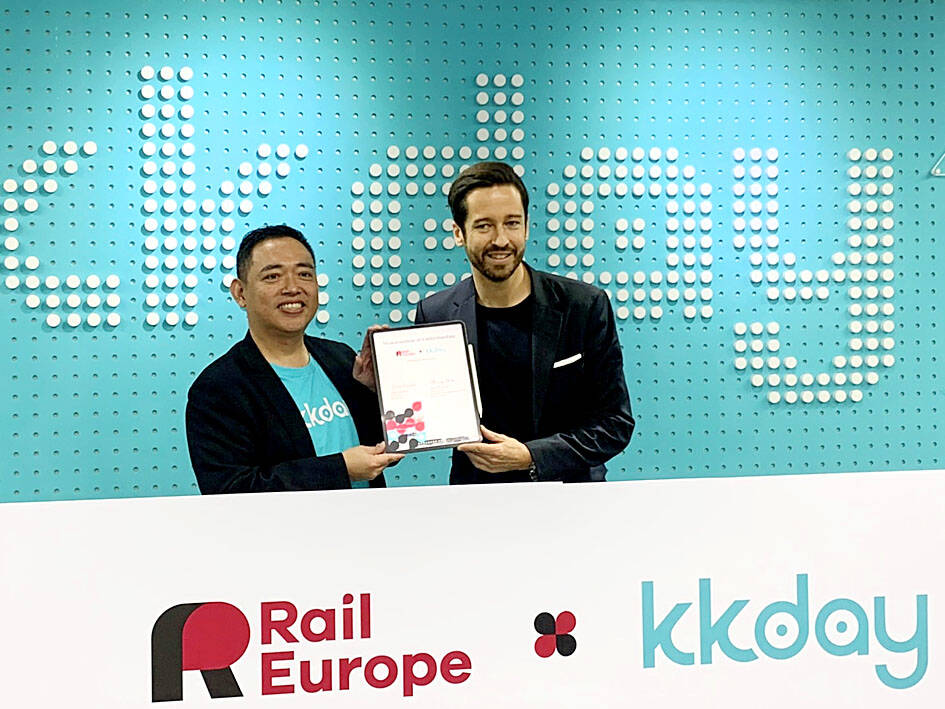Taiwanese e-commerce platform KKday yesterday inked a memorandum of understanding with European train ticket vendor Rail Europe Inc to promote rail travel in Europe.
KKday.com International Co (酷遊天) founder and chief executive officer Ming Chen (陳明明) said that he appreciated the opportunity to work with Rail Europe and he is positive travel growth momentum in Europe would continue next year.
The European travel market had a 60 percent surge in the first nine months of this year from the same period in 2019 before the COVID-19 pandemic, Chen said.

Photo: Ting Yi, Taipei Times
The two sides agreed to focus on product and technology integration, market promotion, passenger experience enhancement and exploration of innovative services.
“The objective of this collaboration is to inspire a deeper exploration of Europe among Asian travelers,” Chen said.
KKday plans to utilize its platform to draw more travel industry partners and enlarge Rail Europe’s customer base, he said.
Rail Europe president and CEO Bjorn Bender said that his visit to Asia has enabled him to gain a better understanding of the region’s diverse markets.
In the post-pandemic era, people have displayed a keen desire to travel and many would opt for train travel to avoid unnecessary flights and help reduce carbon emissions, Bender said.
The company hopes the partnership with KKday would establish an all-in-one platform for travelers and the travel industry that would provide a wide array of products spanning 33 European countries, and more than 150 European rail brands and routes, he said.

RUN IT BACK: A succesful first project working with hyperscalers to design chips encouraged MediaTek to start a second project, aiming to hit stride in 2028 MediaTek Inc (聯發科), the world’s biggest smartphone chip supplier, yesterday said it is engaging a second hyperscaler to help design artificial intelligence (AI) accelerators used in data centers following a similar project expected to generate revenue streams soon. The first AI accelerator project is to bring in US$1 billion revenue next year and several billion US dollars more in 2027, MediaTek chief executive officer Rick Tsai (蔡力行) told a virtual investor conference yesterday. The second AI accelerator project is expected to contribute to revenue beginning in 2028, Tsai said. MediaTek yesterday raised its revenue forecast for the global AI accelerator used

Taiwan Semiconductor Manufacturing Co (TSMC, 台積電) has secured three construction permits for its plan to build a state-of-the-art A14 wafer fab in Taichung, and is likely to start construction soon, the Central Taiwan Science Park Bureau said yesterday. Speaking with CNA, Wang Chun-chieh (王俊傑), deputy director general of the science park bureau, said the world’s largest contract chipmaker has received three construction permits — one to build a fab to roll out sophisticated chips, another to build a central utility plant to provide water and electricity for the facility and the other to build three office buildings. With the three permits, TSMC

The DBS Foundation yesterday announced the launch of two flagship programs, “Silver Motion” and “Happier Caregiver, Healthier Seniors,” in partnership with CCILU Ltd, Hondao Senior Citizens’ Welfare Foundation and the Garden of Hope Foundation to help Taiwan face the challenges of a rapidly aging population. The foundation said it would invest S$4.91 million (US$3.8 million) over three years to foster inclusion and resilience in an aging society. “Aging may bring challenges, but it also brings opportunities. With many Asian markets rapidly becoming super-aged, the DBS Foundation is working with a regional ecosystem of like-minded partners across the private, public and people sectors

BREAKTHROUGH TECH: Powertech expects its fan-out PLP system to become mainstream, saying it can offer three-times greater production throughput Chip packaging service provider Powertech Technology Inc (力成科技) plans to more than double its capital expenditures next year to more than NT$40 billion (US$1.31 billion) as demand for its new panel-level packaging (PLP) technology, primarily used in chips for artificial intelligence (AI) applications, has greatly exceeded what it can supply. A significant portion of the budget, about US$1 billion, would be earmarked for fan-out PLP technology, Powertech told investors yesterday. Its heavy investment in fan-out PLP technology over the past 10 years is expected to bear fruit in 2027 after the technology enters volume production, it said, adding that the tech would